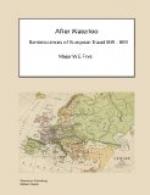I do not wonder at all at this, for I recollect when I was at school at Eton, the system was to drill into the heads of the boys strong aristocratic principles and hatred of Democracy and of the French in particular; we were ordered to write themes against the French Revolution and verses of triumph over their defeats, with now and then a sly theme on the great advantage of hereditary nobility; in these verses God Almighty was to be represented as closely allied to the British Government and a sleeping partner of the Administration. One of the fellows of Eton College actually told the late Mr Adam Walker, the celebrated lecturer on natural and experimental philosophy, who was accustomed to give lectures annually to the Etonians, that his visits were no longer agreeable and would be dispensed with in future; as “Philosophy had done a great deal of harm and had caused the French Revolution.”
With respect to my visit to Versailles, I was much struck with the vast size and magnificence of the buildings and with the ingenuity displayed in the arrangement of the grounds and the numerous groups of statues, grottos, aqueducts, fountains and ruins. Still it pleases me less than St Cloud, for I prefer the taste of the present day in gardening and the arrangement of ground, to the ponderous and tawdry taste of the time of Louis XIV, and I prefer St Cloud to Versailles, just as I should prefer a Grecian Nymph in the simple costume of Arcadia to a fine court lady rouged and dressed out with hoops, diamonds, and headdress of the tune of Queen Anne. Napoleon must have had an exquisite taste.
[32] Exceptions to this are, I understand, the Gallery
at Florence, and the
Museo Vaticano at Rome, which
are both open to all and no fees allowed.
[33] Johann Wilhelm Archenholz (1743-1812), author
of the Geschichte des
Siebenjaehrigen Krieges,
1789.—ED.
[34] In February, 1781, before the declaration of
war was generally known
in the West Indies, Rodney’s
fleet surrounded the Dutch island of
Eustatius, which had become
a sort of entrepot for supplying America
with British goods; two hundred
and fifty ships, together with several
millions worth of merchandise,
were seized and sold at a military
auction. The plunder
of Eustatius was bitterly commented upon In the
British House of Commons.—Lee
Richard Hildreth, The History of the
United States, vol.
III, p. 335.—ED.
[35] The name is in blank. Major Frye may have
meant Beauchamp Bagenal
Harvey (1762-1798), the squire
of Wexford who deserted to the Irish
rebels.—ED.
[36] Tasso, Jerusalemme liberata, canto XVI, ottava 15.—ED.
[37] For instance, a Cuirassier, a Dragoon, a Grenadier,
a Tirailleur, an
Artilleryman.
[38] Major G. Colclough, senior major of the 33rd Regt.—ED.
[39] Virgil, Aen., II. 325.—ED.




